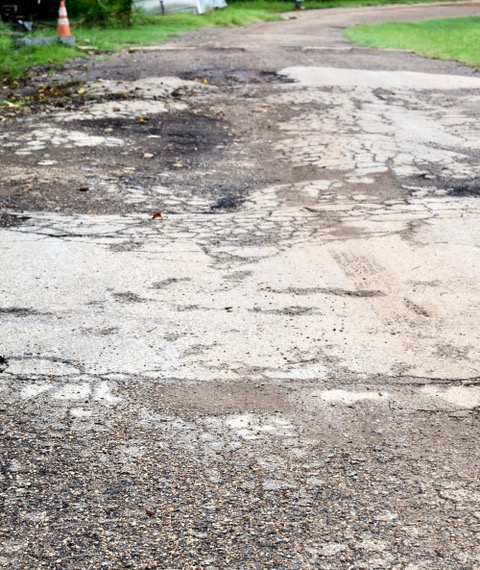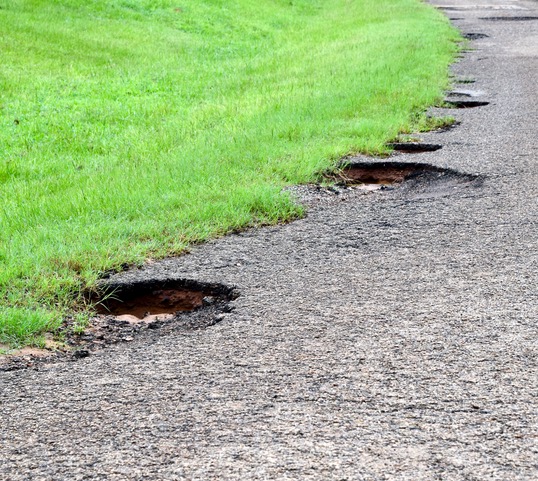Josefina and Mario Vazquez sit around their dining table with neighbors Penny Steel and Anne Thornton. They share stories of navigating the hazards driving in and out of their neighborhood, Mountain Meadows subdivision, located off Highway 164 (Greenbriar Road), north of Lake Placid Road. Tales abound through years of contending with portions of the road completely flooded and impassable from potholes large enough to sink a 55-gallon barrel, wreaking havoc with vehicle alignment, tires and suspension.
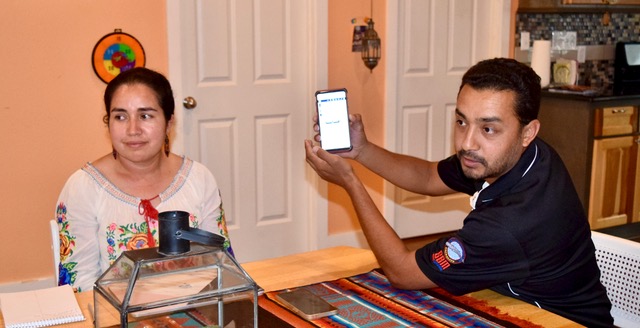
The original plat for the subdivision was approved by the county in March 1986. The roads had to have met county standards at that time; however, the almost two and half miles of roads were not dedicated as public right-of-way.
Thornton, a Mountain Meadows resident since 1992, first brought the neighborhood’s road woes to public attention in 2018. To date, the property owners have no long-term resolution to the problem. Josefina Vazquez, a resident since 2010, is collaborating with neighbors and advocating for the community as they seek avenues to resolve their road issues.
Josefina Vazquez is concerned with the obvious inconvenience and vehicle hazards inherent to the road conditions but also with negative impacts on the community’s health, safety and welfare.
“School buses will not come down the road, and children have to walk almost a mile to catch the bus. The bus comes before 6 a.m. and it is often dark and dangerous at that time,” she said. Mario Vasquez said, “I have seen 10 to 12 kids from elementary to high school age at the bus stop at one time.”

Penny Steel, who moved to Mountain Meadows in 2000, remembers the road’s deterioration. “The roads were nice when I moved here,” said Steel, who uses a motorized chair for mobility. She pointed out the wear and tear on her chair. “Going down to get the mail, I have to go all the way around the road, and it just chews up my tires.”
Steel uses Smith County transit’s GoBus for transportation to doctor’s visits. GoBus will no longer venture into the subdivision because of the roads. Steel said, “They will send a taxi, but that costs them more.”
Steel said GoBus isn’t the only vehicle avoiding the Mountain Meadows roads. “Meals on Wheels used to come every day, but now they come once a week and bring every meal for a week,” she said. Thornton agreed, adding the hazard of slowed emergency vehicles.
Josefina Vazquez said “time and rain” have made the roads “much worse” since her arrival in 2010. The property owners, many of them elderly and on fixed incomes, do what they can in repairs. “We cover the holes at least once a year, sometimes with just dirt but when it rains, it washes away,” she said.
Residents along Olympia Lane have spent approximately $5,000 to replace a culvert but have not been able to complete the project, said Josefina Vazquez. “We spent $3,200 on the culvert on Teton Road, but it’s an incomplete job. We’ve spent another $1,350 for crushed concrete, and we still need at least three more loads to cover the holes.”
In addition to the road being a minefield of potholes, water now routinely stands in portions of Teton Road. During periods of heavy rain, it completely covers the road at times, making it impassable.
According to Thornton and Steel, a dam broke about five years ago on the adjacent property, and “they didn’t build it back as high as it was before.”
Further investigation revealed a dam did not break.
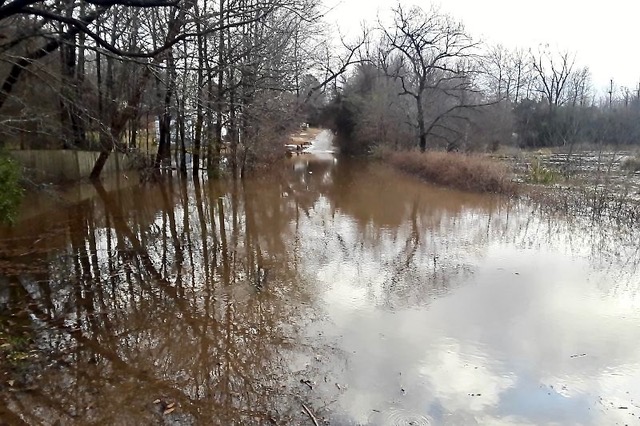
Teton Road in Mountain Meadows subdivision. 📷 Josefina Vasquez
The property was acquired by Butler Creek Mitigation, LLC, in December 2019. Since that time, they have undertaken no construction or activity to alter the property — including the 1960s-era berm impounding Butler Creek.
In her efforts to find some assistance and resolution to their road woes, Josefina Vazquez has contacted numerous public officials. Senator John Cornyn said he had no jurisdiction over the issue and referred her to state and local officials. Representative Louie Gohmert also said he had no jurisdiction in the matter and sent contact information for State Senator Bryan Hughes and State Representative Matt Schaefer.
Josefina Vasquez emailed Schaefer’s office on June 2, 2021, relating the road’s state, health and safety concerns and the names and addresses of 66 of Schaefer’s constituents impacted by the road conditions. She said she has yet to receive a response.
Josefina Vazquez also met with Smith County Precinct 1 Commissioner Neal Franklin on May 28, 2021, in the subdivision. According to Vazquez, Franklin said the roads were the worst he had seen.
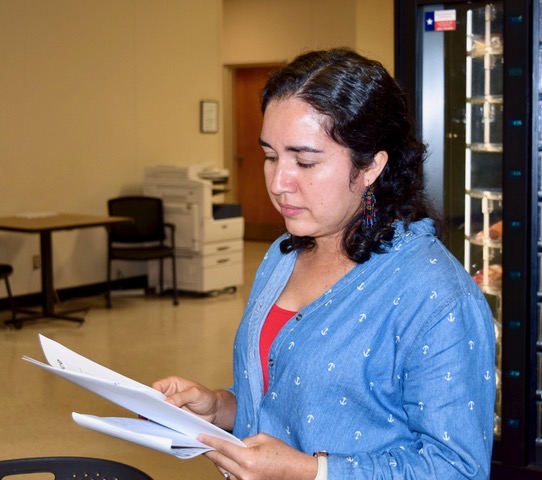
In a subsequent interview, Franklin said the roads were “bad.” Franklin, who assumed his commissioner position January 1, 2021, said, “I am new at this and upon first meeting with Ms. Vazquez, I didn’t know they were private roads.” As he realized they were discussing private roads not eligible for county maintenance, Franklin discussed some options for bringing the roads up to county standards.
In correspondence over the next two months with Josefina Vazquez, Franklin said he had spoken with the County Engineer and the County Judge, but neither were aware of any grants or foundations that might assist with road construction – a funding option Josefina Vazquez hoped for.
Franklin offered her the name of a local asphalt company familiar with the county road standards who could give her cost information. He also referred her to the County Road and Bridge Department for information regarding road standards and the process required before the county could consider taking a private road into the county road system.
Franklin said Mountain Meadows residents could potentially be absorbed by the county. “If they meet our standards, yes, I will be supportive,” he said.
Per Franklin’s request, Doug Nicholson, Smith County Road and Bridge and Flood Plain administrator reached out to Josefina Vazquez July 22, sending her an Application for County Road Maintenance.
She completed and returned the application on July 23. At the time of her interview on August 2, Josefina Vazquez said she had received no acknowledgement regarding receipt of the application or information on county road standards.
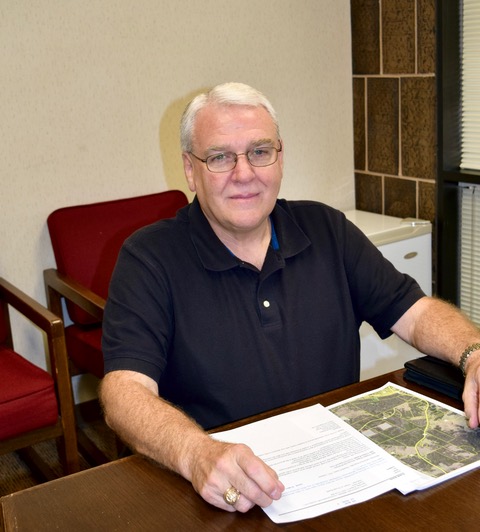
Smith County engineer Frank Davis is responsible for the care and maintenance of 1,170 miles of county roads. In his August 3 interview, Davis said he was familiar with Mountain Meadows roads. “Those roads are getting pretty bad.”
Davis said his office has the application for county road maintenance from Mountain Meadows. “I will be looking at it. I’ve got to sit down with our legal and the auditor to see how we want to proceed with that,” he said.
Davis said the homeowners have two options petitioning the county to assume maintenance of the roads and bring them into the county public road system. The preferred option is that homeowners repair the roads, bringing them to county standards and then asking the county to assume maintenance.
Davis said bringing a road to standard depends on the current condition of the road and soil testing to determine the type and depth of the base and overlay materials needed. “We [Road and Bridge Department] would inspect [the roads] during construction to document that they are built to standard, because I’m going to be the one to present all this to the court,” said Davis.
Even if the road is to standard, there is no guarantee the county would absorb the road. Property owners are only assured they can make a request. “The court does not have to accept a road into the county maintenance system [even if it meets standards],” said Davis.
Davis said there is a second, less preferred mechanism available to Mountain Meadows residents to petition the county to assume road maintenance. This requires an application from the property owners as well as a balloting and assessment process, outlined in Chapter 253 of the Texas Transportation Code.
The county can determine that road improvements are “necessary for the public health, safety, and welfare” of the residents. Once decided, the Commissioners’ Court may propose improvements and costs assessed pro rata to the property owners, following the Transportation Code guidelines.
In this scenario, the property owners do not have to pay for all the repairs up front. Conversely, the county holds a lien against the real property of the assessed property owner.
Davis estimates road construction costs to be about $40 per linear foot. His estimate is based on “some of the roads we are reworking now with a contractor doing the job. That’s a hard top, asphalt surface. It might go to $45, but $40 is pretty good.”
In a worst case scenario, the roads would need complete reconstruction to meet standards. Property owners are looking at approximately $500,000 – a hefty bill.
JoAnn Hampton, Precinct 4 Commissioner since 2003 and the county’s longest serving current commissioner, recalls only one time in the last 18 years that the court assumed maintenance of a private road.
That occurred in 2009 according to County Engineer Frank Davis, when the county added two dirt roads. The addition came with strict maintenance instructions to be smoothed out only with maintainers so that emergency service vehicles could access the road.
In December 2011, the court expanded those repairs to include the installation of drainage culverts. After that instance, Hampton said, “The court basically said they never wanted to do it again.”
She suggested the property owners consider contacting the developer’s family for assistance. She also reiterated the processes available to the property owners through the Road and Bridge Department.
Mario Vasquez is considering do-it-yourself options. “I think the neighborhood is diverse enough (in skills) that we can probably handle the project. We have people from construction to concrete work. We have people who know how to work heavy equipment. We have people who know people who can do the work.”
“Where we hit a wall is how we do the project. What do we need to do? We need someone to tell us – the road needs to be 60 inches wide, you need culverts in every driveway, so on and so forth.”
Mario and Josefina Vazquez are confident that with guidance, the community members can work on small portions of the road at a time and bring it up to county standards.
The neighbors of Mountain Meadows are considering various ways to raise the funds needed for the repairs. “[Mountain Meadows residents] might not have money to chip in, but they are willing to do the work,” said Josefina Vazquez.
Josefina Vasquez said the neighbors are looking into a large garage sale in another location; and offering homemade food items for purchase and delivery. They have discussed the possibility of a raffle and creating a GoFundMe page for donations from the larger community.
“Sometimes I feel discouraged, so many obstacles,” said Josefina Vazquez. “But then I keep thinking and talking to everyone and my neighbors. I feel like there is a way. I feel we can do this.
“The key to accomplish this is that we all work together. We are working together, united so we can get it done. We deserve better roads.”
Brenda McWilliams is retired after nearly 40 years in education and counseling. When not traveling she fills her days with community, charitable, and civic work; photography; writing and blogging at Pilgrim Seeker Heretic; reading, babysitting grandchildren, and visiting with friends. She enjoys walking at Rose Rudman or hiking at Tyler State Park. Brenda and her spouse, Lou Anne Smoot, the author of Out: A Courageous Woman’s Journey, have six children and seven grandchildren between them.
Love what you're seeing in our posts? Help power our local, nonprofit journalism platform — from in-depth reads, to freelance training, to COVID Stories videos, to intimate portraits of East Texans through storytelling.
Our readers have told us they want to better understand this place we all call home, from Tyler's north-south divide to our city's changing demographics. What systemic issues need attention? What are are greatest concerns and hopes? What matters most to Tylerites and East Texans?
Help us create more informed, more connected, more engaged Tyler. Help us continue providing no paywall, free access posts. Become a member today. Your $15/month contribution drives our work.


